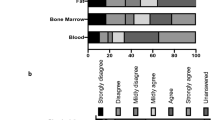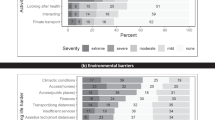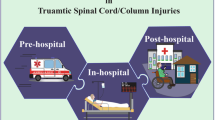Abstract
To ensure that research outcomes are relevant and meet the needs of the spinal cord jury (SCI) community, it is essential that people with lived experience of SCI (‘consumers’) are actively involved in all stages of the research process. One of the goals of the Spinal Research Institute (SRI) (www.thesri.org) is to facilitate this active engagement of consumers in research. In order to support consumer involvement, appropriate resources, including remuneration, need to be in place. This paper sets out the process undertaken by the SRI to develop a Policy for Consumer Remuneration. It addresses the rationale for creating a policy, the resources used and shares the model that defines the levels of consumer engagement and associated remuneration. The SRI Policy for Consumer Remuneration sets a standard for the SCI research field, which can serve as a model for Australia and as a template for other countries.
Similar content being viewed by others
Login or create a free account to read this content
Gain free access to this article, as well as selected content from this journal and more on nature.com
or
Data availability
Data sharing not applicable to this article as no datasets were generated or analysed during the current study.
References
Anderson KD. Equitable partnerships between scientists and persons living with spinal cord injury will strengthen research scope, quality, and outcomes. Curr Opin Neurol. 2021;34:783–8.
Gainforth HL, Hoekstra F, McKay R, McBride CB, Sweet SN, Martin Ginis KA, et al. Integrated knowledge translation guiding principles for conducting and disseminating spinal cord injury research in partnership. Arch Phys Med Rehabil. 2021;102:656–63.
Canadian Institutes of Health Research. Considerations when paying patient partners in research. 2022. https://cihr-irsc.gc.ca/e/51466.html
Patient-Centered Outcomes Research Institute. A Framework for Financial Compensation for Patient Partners in Research. 2015. https://www.pcori.org/blog/framework-financial-compensation-patient-partners-research
Government of South Australia, SA Health. Consumer, carer and community engagement. 2022. https://www.sahealth.sa.gov.au/wps/wcm/connect/public+content/sa+health+internet/about+us/about+sa+health/consumer+carer+and+community+engagement
Victorian Comprehensive Cancer Centre Pty Ltd. What is the toolkit? 2022. https://vcccalliance.org.au/our-work/consumer-engagement/toolkit/
Australian Government, Australian Taxation Office. Honorariums. 2017. https://www.ato.gov.au/Non-profit/Types-of-Not-for-profit-workers/Not-for-profit-volunteers/Paying-volunteers/Honorariums/
Australian Government, Australian Taxation Office. Statement by a supplier not quoting an ABN. 2017. https://www.ato.gov.au/forms/statement-by-a-supplier-not-quoting-an-abn/
Safer Care Victoria. A guide to consumer remuneration. In: A guide to consumer remuneration. State of Victoria. 2022. https://www.safercare.vic.gov.au/sites/default/files/2019-01/A guide to consumer remuneration.pdf. Accessed 20 November 2022.
Acknowledgements
We thank the following people: Ms Emma Peleg and Associate Professor Doug Brown AM, Spinal Research Institute, Australia, for input during the policy development process, and reviewing and commenting on this article; Dr Linda Barclay, Spinal Research Institute, Australia, for reviewing and editing the manuscript; and Mr John Chernesky, Praxis Spinal Cord Institute, Canada, for providing a guiding hand as we launched our consumer engagement work in 2019/2020.
Funding
Funding for the SRI’s Consumer Engagement Program was provided by the Transport Accident Commission and IOOF Foundation.
Author information
Authors and Affiliations
Contributions
KH was responsible for seeking out and reviewing publicly available consumer remuneration resources, writing the policy document, and writing the manuscript. AV was responsible for seeking out and reviewing publicly available consumer remuneration resources, engaging with the VCCC, reviewing the policy document, and reviewing, editing, and commenting on the manuscript.
Corresponding author
Ethics declarations
Competing interests
The authors declare no competing interests.
Ethics approval
No animal or human participants were studied, therefore ethics approval was not applicable.
Additional information
Publisher’s note Springer Nature remains neutral with regard to jurisdictional claims in published maps and institutional affiliations.
Rights and permissions
Springer Nature or its licensor (e.g. a society or other partner) holds exclusive rights to this article under a publishing agreement with the author(s) or other rightsholder(s); author self-archiving of the accepted manuscript version of this article is solely governed by the terms of such publishing agreement and applicable law.
About this article
Cite this article
Hendry, K.L., Vecchio, A. Involving people with lived experience of spinal cord injury in research: a policy for consumer remuneration. Spinal Cord 61, 285–287 (2023). https://doi.org/10.1038/s41393-023-00888-0
Received:
Revised:
Accepted:
Published:
Issue Date:
DOI: https://doi.org/10.1038/s41393-023-00888-0



